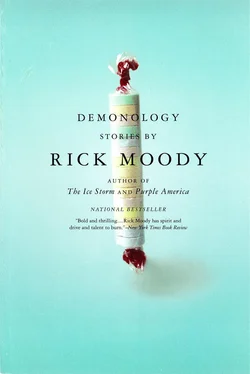Gerry Abramowitz, the legal aid lawyer of Providence, RI, insisted on the language of identity politics, Percocet or no Percocet. He was a disabled person, not a handicapped person. And yet, in his privacies he thought of the injured arm not as some poignant but surmountable problem, but as the Claw. Finally, all places and times of youth had been reconsidered until they did nothing but refer to or predict or reflect back upon the Claw. The useless and homely Claw. Everything was Before Claw and After Claw, and these places he was remembering that were Before Claw, they receded at an alarming rate, like distant galaxies, hurtling toward a margin of space where, in a dazzling and romantic nothingness, they were refracted distortedly: Connecticut, the years when he was in college, the year when he lived in Hoboken, in brief faux-connubial bliss, the following year in Jersey City, all Before Claw, before the weekend when he decided to go look at autumn foliage, alone, because he couldn’t find anyone to go along. What a stupid way to spend a weekend. If he had just stayed home, if he had gone to see movies in the city, then he wouldn’t be doubling up on Percocet, remembering. Everything Before Claw was better than the monochromes After Claw, everything was sweet and acute in the time before. Now daily life was pale and thin, a low-sodium canned broth; After Claw was all survival, how admirable it seemed to survive another year, to have a few friends whom you had known for a while. After Claw, shampooing was a victory; After Claw, knowing the birthday of two or three people was the height of solicitousness; After Claw, being polite to the guy in the dry cleaner up the block was very good; After Claw, thanking a bus driver was remarkable; After Claw, trying a new cuisine was adventurous; AfterClaw, remembering to vote was heroic; After Claw, feeling like taking your clothes off in the presence of a lover was an astonishment (easier to watch television); After Claw, the Weather Channel was the most serene and beneficent institution on earth; After Claw, it was the little things: not having a malignant tumor, not having your hair fall out from chemotherapy not having a colostomy shunt; After Claw, a child that didn’t scream was beautiful, as was a geranium that blossomed once, a cardinal that landed on the feeder, a mailbox without a letter from the tax authorities, a cereal that tasted okay, a government that did something about poverty, a neighbor who told you to close your windows before a storm, a friend who wanted to talk, a sky that cleared. After Claw, everything that was before was better than it had actually been; After Claw, all was poignant and diminished and sad, and all that was Before Claw, was shiny, new, and lost.
When the sirens began, there was a rush toward the cars parked in the driveway Sheets were abandoned on the lawn. The girl parked in the car next to him was from Wilton, it turned out. They barked out a short conversation. She was the one he’d seen before wearing a costume, a tutu of crinoline, in gold, with white tights. And he met her again six years later, in the city. Same girl. Three times he had idealized her, therefore, once when he was a kid and she was pleasant to him, once when he was in his twenties and she was leaving him, and once in this remembering. But when the carnival of youth left town, leaving behind its crushed Styrofoam cups, dismembered Kewpie dolls, and beer vomit, idealism hitched a ride, in its wake only symptoms of withdrawal. Remembering was a flu then, remembering was a sickness, and his skin crawled, and his nose ran, and his eyes were red, and he couldn’t get comfortable with the temperature in this cramped apartment, and blowing his nose was impossible, because of his bad arm. The girl in the tutu drove a Volvo now, and picked up her own girl in a tutu from the ballet school in Larchmont; and if she called, he deferred to the answering machine, and failed to call back. It was a delirium of stories in which the principals never quite met, never quite spoke, never quite loved, never quite left. The pieces didn’t match and never would, but the pieces were almost identical. The girl in the tutu pirouetted by him on his bad side, and he knew now, indisputably, he was older.
Wilkie Fahnstock, The Boxed Set
The ground-breaking, innovative collection you have before you represents a new milestone in the history of Bankruptcy Records, a profound effort to bring to the public one of the representative lives of the last century. Bankruptcy here endeavors to depict Wilkie Ridgeway Fahnstock in a format he personally favored during his lifetime, that of the old-time magnetic tape cassette — in this instance a ten-volume anthology of such cassettes, one for each of the important periods of Fahnstock’s life, including the Greenwich Years, the years in Kingston, Rhode Island, etc. (See our Website for more information about other exciting Bankruptcy releases, including collections like the home videos of the McGill family of Poughkeepsie, NY (“Shannons fifth birthday party”“Summer Theater Production of OUR TOWN, 6/21/76!“), and the laser-disk-only release of STAR TREK EPISODES I REALLY LIKE by Rochester, NY, software designer Greg Tanizaki.)
The earthquake-like cannon blasts of Tchaikovsky’s 1812 Overture serve here as an eclat for Wilkie Fahnstock’s 1964 birth, without complications, at the Mercy Hospital of Greenwich, CT. His mother, Elise Fahnstock (nee Roosevelt) was and is a classical music fanatic, and Tchaikovsky and other classical greats such as Beethoven and Mozart were often spinning on the playroom hi-fi near Wilkie’s crib, especially in renditions by Arthur Fiedlers Boston Pops. Later, when Wilkie briefly tried to learn the violin, he surreptitiously played records of the Bach Cello suites (the Pablo Casals recording) in an effort to fool his mom into believing he was practicing.
Tragedy struck in 1970, when Elise Fahnstock’s marriage to Stannard Buchanan Fahnstock ended in acrimonious divorce — to the sounds of Simon and Garfunkel’s Bridge Over Troubled Water. Wilkie’s dad took to an apartment in New York City in order to date a succession of chainsmoking, high-fashion models. Poor Wilkie! Poor little sister Samantha! Suddenly the tender pop classics of the middle and late sixties — the sunny harmonies of the Beach Boys, the raucous fun of Tommy James and the Shondells, the prepubescent funk of the Jackson Five — gave way to the darker moods of early seventies “progressive rock”stylings. Wilkie, alone in his room (in a succession of split-level Tudor homes throughout the County of Westchester), was contemplating the multiples of Rusty Staub baseball cards while the ominous chords of Mike Oldfield and Pink Floyd floated through his depressive consciousness on a mono-phonic Zenith brand “record player.”Of course, the surge of national drug experimentation was also a part of Wilkie Fahn-stock’s adolescence, as with so many of his peers, and on cassette two (actually dubbed from a moldering Memorex ninety-minute tape found in an old summer camp foot locker), we see for the first time the “heavy”music of such acknowledged “drug”bands as Led Zeppelin, Alice Cooper, and the Moody Blues, especially as these portentous sounds vied for Wilkie’s attentions with the simple easy confections of Elton John.
Now, as Fahnstock’s parents shipped him off to the Phillips Academy at Andover, as Elise Fahnstock — newly betrothed to Fred Bolger, the reinforced-carton magnate — undertook a demanding career as Metro politan Museum docent, as Stannard Fahnstock relocated his consulting business to Mar-blehead, Mass., the collection succumbs to a brief infatuation with the dazzling surfaces of “glam”rock, characterized by the abundant makeup of bands like Kiss and David Bowie. (Fahnstock tried, at this point, to get a few other prep school chums interested in forming a band featuring fire-breathing and spitting up blood, but given his own character — bad hair combined with high grades, unflattering eyeglasses and a poor sense of rhythm — this plan was doomed from the start.) On the B side of cassette three, however, there’s a precipitous turning toward the introspective, Californian singer-songwriter stylings of the seventies. Probably it was peer pressure. Probably it was the influence of his boarding school contemporaries. In any case, it’s as if Fahnstock comes home across the big Atlantic puddle. Take it easy, dude! Skip trigonometry! Smoke a reefer!
Читать дальше












